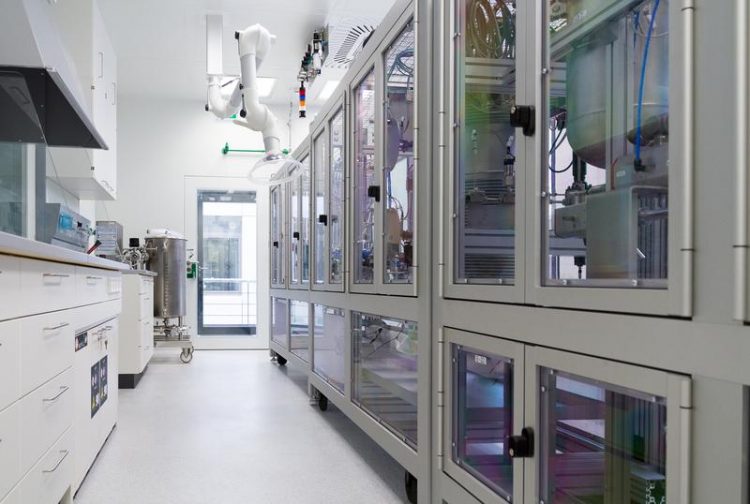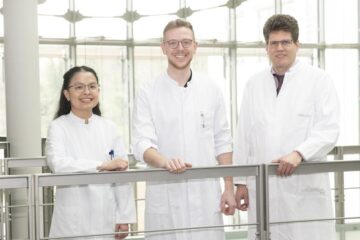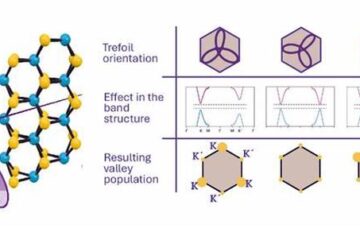The product-friendly preservation of beverages – testing under hygienic conditions

At Fraunhofer IGB the preservation of beverages and liquid foodstuffs, and also cell disruption, can be tested under hygienic conditions using the PCT research plant. Fraunhofer IGB
Microorganisms cause the spoilage of fresh foodstuffs. For a longer shelf life, microorganisms must therefore be inactivated or their reproduction must be inhibited. Chemical preservatives, which are mainly used today, may cause allergic reactions; their acceptance as food additives has consequently decreased. Due to greater health and environmental awareness, the requirements relating to the quality of our food have also changed.
Today, a growing number of consumers demand safe and, as far as possible, “clean” foodstuffs in their natural state and without artificial additives. As a rule, beverages are currently treated with thermal processes. However, not only the microorganisms are killed by pasteurization and especially by heat sterilization: heat-sensitive and nutritionally relevant ingredients such as vitamins or proteins are also destroyed. And besides this, taste and color are affected.
Pressure change technology (PCT) is a physical process for the product-friendly preservation of liquid foodstuffs. In recent years, the Fraunhofer Institute for Interfacial Engineering and Biotechnology IGB has investigated the process, which is also called “cold pasteurizing”, and has further developed it through to application maturity.
In the EU-funded project “PreserveWine”, for example, the addition of sulfur dioxide to the wine was considerably reduced by using PCT. “We have shown that the color of PCT-treated wine is preserved, even over longer periods of time, and that flavor is not affected,” says Dr. Ana Lucía Vásquez-Caicedo about the research findings.
Pressure change causes cells to burst
In pressure change technology the liquid to be preserved is enriched and mixed with a chemically inert gas, for example nitrogen or argon. If the pressure is increased to up to 500 bar, the dissolved gas diffuses through the cell membrane into the microorganism cells. If the pressure is then abruptly lowered, the gas – including that within the cells – regains its original gaseous state, thus expanding and causing the cells to burst.
“The process does not require any chemical additives, and since the foodstuffs do not have to be heated, the biological function of the ingredients is fully retained,” explains Dr. Ana Lucia Vásquez-Caicedo. A further advantage of the new technology is that, at the same time, it has a conserving effect in two different ways: On the one hand, the microorganisms are destroyed. On the other, the working gas acts as a protective atmosphere and prevents atmospheric oxygen from damaging sensitive ingredients.
PCT research facility under hygienic conditions
On the basis of years of research and project work, Fraunhofer IGB experts have now built a PCT testing facility in which they can investigate the process for the stabilization and preservation of any liquid products and can determine the optimum parameters in each individual case. The facility is located in a cleanroom technical center (Class E cleanroom), so that the investigations take place under hygienic conditions without risk of contaminating the product.
The PCT research facility can treat up to four liters of liquid per minute continuously. The process is suitable for all beverages that are normally pasteurized, i.e. fruit and vegetable juices or concentrates, and also alcoholic beverages, milk products, plant extracts and suspensions containing active substances, e.g. cosmetic and pharmaceutical preparations. Additionally, for basic testing – for example, at a customer’s location – a flexibly configurable and mobile PCT lab plant is currently being constructed.
Cell disruption for the product-friendly release of ingredients
Pressure change technology does indeed destroy the cells, but it does not change their ingredients, so this opens up a further field of application for the technology. Plant or microbial cells can be disrupted to release valuable intracellular metabolites. Fraunhofer IGB researchers have already tested the process for microalgae cells and extracted high-quality fatty acids for dietary supplements and pigments for cosmetics.
“If we then also combine the PCT process with high-pressure extraction, we can obtain omega-3 fatty acids with much greater energy efficiency than previously, yet achieving at least the same quality,” Vásquez-Caicedo adds. The high-pressure extraction does not require the use of any solvent. That is good both for the environment and for the preparation of the extracts.
Formal inauguration
On June 21, 2016 the 1st Technical Colloquium “Current and Future Applications of High-Pressure Technologies in the Food Industry” will present current results and future possibilities of this and related high-pressure technologies. The PCT plant will be inaugurated in conjunction with the colloquium, during a subsequent visit of the plant.
For further information and preliminary program www.igb.fraunhofer.de/en/pctcolloquium
We very much hope that you will include the presentation and demonstration in your events calendar.
You are cordially invited to the inauguration of the plant.
If you are interested please contact us.
http://www.igb.fraunhofer.de/en/pctcolloquium Program PCT inauguration
http://www.igb.fraunhofer.de/en/press-media/press-releases/2016/the-product-frie… Press release at Fraunhofer IGB website
Media Contact
All latest news from the category: Life Sciences and Chemistry
Articles and reports from the Life Sciences and chemistry area deal with applied and basic research into modern biology, chemistry and human medicine.
Valuable information can be found on a range of life sciences fields including bacteriology, biochemistry, bionics, bioinformatics, biophysics, biotechnology, genetics, geobotany, human biology, marine biology, microbiology, molecular biology, cellular biology, zoology, bioinorganic chemistry, microchemistry and environmental chemistry.
Newest articles

Simplified diagnosis of rare eye diseases
Uveitis experts provide an overview of an underestimated imaging technique. Uveitis is a rare inflammatory eye disease. Posterior and panuveitis in particular are associated with a poor prognosis and a…

Targeted use of enfortumab vedotin for the treatment of advanced urothelial carcinoma
New study identifies NECTIN4 amplification as a promising biomarker – Under the leadership of PD Dr. Niklas Klümper, Assistant Physician at the Department of Urology at the University Hospital Bonn…

A novel universal light-based technique
…to control valley polarization in bulk materials. An international team of researchers reports in Nature a new method that achieves valley polarization in centrosymmetric bulk materials in a non-material-specific way…





















